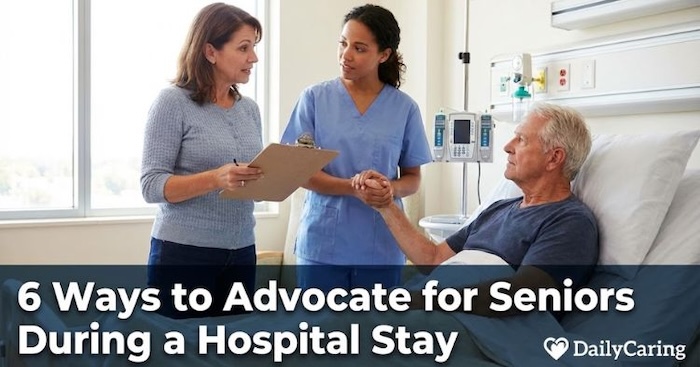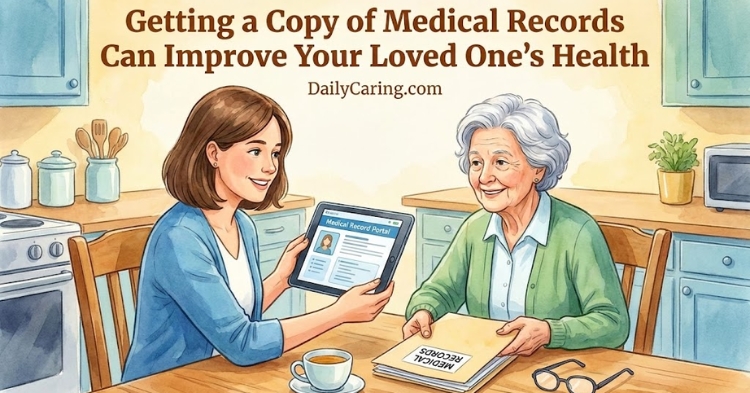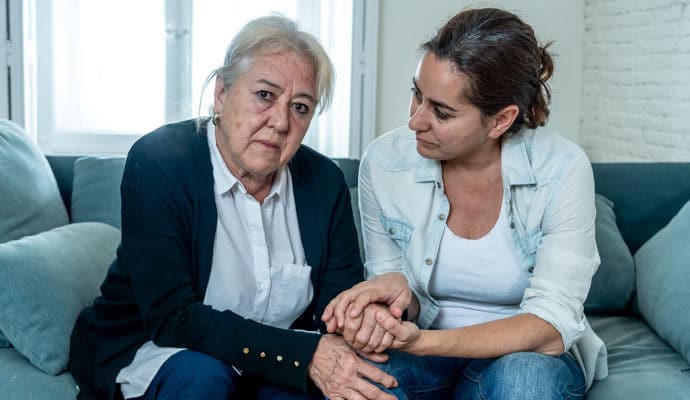A hospital stay can be a disorienting and vulnerable experience for an older adult, making the presence of a dedicated advocate invaluable. As families navigate this challenging time, their role extends beyond emotional comfort to becoming active participants in care.
By providing vigilant support, from monitoring medications to ensuring clear communication with medical staff, family advocates can significantly influence recovery outcomes.

This article explores six practical ways to be an effective champion for a senior’s health and well-being during their hospital stay, helping to prevent common complications and pave the way for a smoother recovery.
Seniors Need Extra Support When They’re In the Hospital
A hospital stay can be confusing, scary, and painful. When your older adult is seriously ill or after a medical emergency, they need extra support during their hospital stay.
Having an advocate, emotional support, and extra assistance reduces the risk of common complications, such as delirium, and can help speed up their recovery.
We share 6 ways to support your older adult while they’re in the hospital and include plenty of practical suggestions.
6 Ways to Advocate for Seniors When They’re In the Hospital
1. Stay with them if you can, or visit as often as possible
It’s important to stay with an aging adult or visit as often as you can. Familiar faces and trusted people who will watch out for their best interests are a great comfort.
Because your older adult is recovering from a serious health event, they may not be up to doing much.
Gentle, low-key activities they may enjoy during a visit include:
- Sitting quietly together, perhaps holding hands or gently stroking their arm
- Softly listening to their favorite music
- Giving them a gentle massage on non-sensitive parts of the body
- Reading aloud from books or the newspaper
- Eating a meal together (you would bring your own)
- Telling them about what you, your close family, and friends have been doing lately, so they won’t feel left out
- Bringing a computer or tablet to watch a favorite show or movie together
2. Advocate and monitor your loved one closely
Mistakes, especially with medication and food, often happen in hospitals, and staff aren’t always around when needed for assistance.
Monitor medication
When you’re with an older adult, take notes on the medications they’re taking to ensure they're taking the correct drug at the correct dose, given at the right time.
If other family and friends are available, work out a schedule to maximize coverage of hours and use a notebook to keep everyone informed.
It’s also important to check that your older adult is getting the right levels of medication. They shouldn’t be in pain or overmedicated.
Improperly managed pain can slow healing and recovery. Overmedication can cause negative side effects and increase the chances of developing delirium.
Make special needs extra clear to staff
Don’t assume that the staff is carefully reading the notes in your older adult’s chart (if there even are any). It’s necessary to ensure the nurse in charge and other staff are aware of any special needs and how to address them.
If your loved one has dementia, dysphagia, severe arthritis, or other health conditions, they may need extra help and patience.
If your older adult has special dietary needs, make sure to check all their food and beverages. They may need thickened drinks for dysphagia, a low salt diet for high blood pressure, low sugar for diabetes, etc.
Things could get mixed up, and they could end up with the wrong food or drinks. If they’re not aware enough to refuse the incorrect meal, they could end up eating or drinking it and have a problem.
Help your loved one get timely assistance and attention
In terms of getting help, like assistance going to the bathroom or another blanket when they’re cold, sometimes it takes a strong advocate to get timely attention from busy hospital staff.
3. Anchor to reality to reduce the chance of developing delirium
Many cases of hospital-induced delirium are triggered by treatments that older adults are especially sensitive to, like large doses of anti-anxiety drugs and narcotics.
Speak with the doctor to minimize the amount of these medications and, if you’re noticing negative side effects, ask them to make changes immediately.
Other cases of delirium are caused by the busy, noisy, brightly lit environments that constantly interrupt sleep.
To reduce the risk, ask staff to lower the lights when possible, turn down noisy machines when possible, close the door to keep noise down, stay with them so they have a familiar face nearby, and arrange for them to get as much sleep as possible.
Periodic blood draws and vital sign readings are very disruptive to rest and sleep. Ask doctors and nurses whether these can be done in coordination or less frequently (without harming health). This keeps your older adult from being constantly poked and prodded, especially in the middle of the night.
You may also want to add some anchoring elements in their room. Make a large-print clock and calendar visible, so if they like, your older adult can see the time and date. Add a family photo so they always have familiar faces to look at.
4. Make your loved one more comfortable
Being in the hospital also means missing the comforts of home. Depending on the situation, it may help to bring in a few inexpensive items that would make them more comfortable.
Some items to consider:
- Moist wipes for comfortable toileting
- Skin moisturizer and lip balm
- Toiletry and frequently-used personal care items
- Non-skid slippers
- A cozy cardigan or robe
- An inexpensive radio or tape player for soft music
- A comforting blanket, doll, or stuffed animal
- Favorite books or magazines
5. Plan for discharge and post-hospital recovery
Even though your loved one can leave the hospital, they’ll still need extra care. They might even need intensive care for weeks or months.
Studies show that 40% of patients over 65 had medication errors after leaving the hospital. Even worse, 18% of Medicare patients discharged from a hospital were readmitted within 30 days.
Many issues that hinder recovery can be prevented if you and your older adult are well-prepared for hospital discharge.
A hospital discharge checklist is an essential tool that prepares for a successful recovery.
It tells you key questions to ask doctors and nurses, what information is must-have, the level of care needed, and what supplies to get.
6. Assist with moving around and physical therapy
Moving around and doing prescribed therapy helps with recovery.
Spending too much time lying in bed weakens muscles and increases the risk of blood clots, confusion, and bed sores. Of course, the priority remains keeping your older adult safe and not overdoing it.
If possible, accompany them to any physical, occupational, or speech therapy sessions. Watch and take notes on what the therapist asks them to work on. Ask if there are exercises you can help them practice outside of the sessions.
Whenever possible, ask aging adults to take short walks or practice therapy exercises. With you at their side to keep them steady and safe, they’ll be able to gradually increase their activity level and improve recovery. Movement is one of the keys to longevity, and science is strongly promoting exercise for aging adults.
Final Thoughts on Advocating for Seniors During a Hospital Stay
Ultimately, effective advocacy is about being a persistent, compassionate, and informed partner in care. The journey doesn't end at discharge; planning for the recovery phase with a thorough checklist is crucial to prevent readmission. By staying present, anchoring your loved one to reality, and assisting with mobility, you provide the essential support that complements medical treatment.
Remember, your involvement as an advocate is a powerful force in safeguarding your older adult’s health and ensuring they receive the respectful, attentive care they deserve throughout their hospital experience and beyond.
Recommended for you:
- 9 Ways to Make Hospital Visits Easier for Seniors with Dementia
- 4 Ways to Know If Seniors Need to Return to the Hospital
- 7 Tips for Helping Seniors at the Doctor: Being a Health Advocate
A version of this article was originally published on Sixty and Me
About the Author

Connie is the founder of DailyCaring.com and was a hands-on caregiver for her grandmother for 20 years. (Grandma made it to 101 years old!) She knows how challenging, overwhelming, and all-consuming caring for an older adult can be. She also understands the importance of support, especially in the form of practical solutions, valuable resources, and self-care tips.














This article is a few weeks too late for when I had to take my mother who has Alzheimer’s to the hospital.
After reading the article, I see that I did OK. It seems to be a matter of using basic common sense … because most of the tips I had to employ.
Unfortunately, the first two nights being alone, had my mother totally confused and disoriented, so I opted to spend the rest of her stay nights in the ward with her (a Big No-No at that hospital), with the blessing of the head nurse and a couple doctors. Even to the point of sleeping on the same bed with her (when the other beds were occupied). She slept like a baby with no problems/trouble whatsoever.
Also, I was very, very fortunate that the doctors and nursing staff allowed me to sleep with her in a 5-person ward. Mind you – I have still saved and printed this article, just as a reminder, and for other useful tips that I may have to employ at some future stage. THANK YOU!!
It sounds like you did an amazing job of supporting your mother during her hospital stay. Having you there with her clearly made a huge difference.
In case it’s helpful, we’ve also got an article with tips on how to make a hospital visit easier for people with dementia — 9 Ways to Make Hospital Visits Easier for Seniors with Dementia https://dailycaring.com/9-ways-to-make-hospital-visits-easier-for-seniors-with-dementia/
I can recommend the book “The Informed Patient: A Complete Guide to Hospital Stay” by Karen Friedman and Sara Merwin. Very helpful.
Thank you for the recommendation!